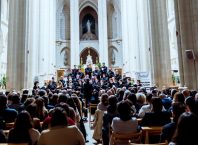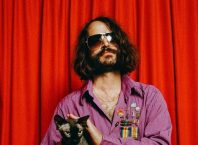“בְכָל מָקוֹם גַּרְתִּי / סְפָרִים חִבַּרְתִּי/ וְסוֹדוֹת בֵּאַרְתִּי”
אברהם אבן עזרא – מתוך נְדוֹד הֵסִיר אוֹנִי
“In every land I’ve sojourned/books composed/and secrets illuminated…” – the words dance on my lips in Hebrew, their rough translation in English cannot convey the poetry, but I sing them as I write and feel them as close to my heart as the words of a friend, although they were written so many years ago. The words and works of Rabbi Abraham Ibn Ezra (1092-1167) inspired the opening performance of the Jerusalem International Oud Festival, a musical tribute to the poet philosopher by Hamadregot, with special guests Ehud Banai, Shlomi Shaban, Shaanan Street, Lior Elmaliah and Albert Amar, that took place at the Jerusalem Theatre on Thursday, November 8, 2012.
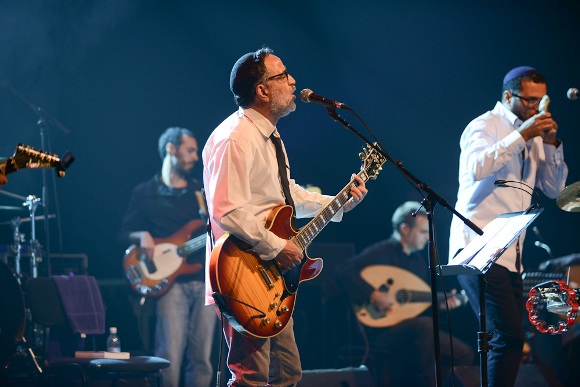
Hamadregot have been performing and creating Jewish rock together since Ilan Damri and Hod Dayan first met as they each reconnected to their Jewish roots and traditions, their first album BePetach HaDelet (At the Threshold) was released in 2000, and they have been making music together ever since, both original compositions, and, as at the Oud Festival, composing and arranging piyyutim, Jewish liturgical poems. The Oud Festival, under the artistic direction and inspiring spirit of Effie Benaya, has established several beloved traditions over the past twelve years: celebrating the Oud and the diverse musical and cultural traditions featuring the instrument, creating new encounters between musicians and cultures, connecting Middle Eastern and Western musical traditions, classical Arab music and Jewish piyyut, and reviving the works of the Golden Age of Spain. Last year’s concert Red Lips, featuring Berry Sakharof and Rea Mochiach dedicated to the works of poet Ibn Gabirol, and Hamadregot’s Abraham Ibn Ezra: Heart, Spirit and Soul feature these classical Jewish works in new arrangements, both projects are recorded and released as albums.
A wanderer in exile throughout most of his life, born in Tudela, Abraham Ibn Ezra left Spain before 1140. His travels led him through North Africa, Egypt, the land of Israel, Italy, France and England. Known for his Biblical exegesis, Ibn Ezra is also remembered for translating the intellectual treasures of the Golden Age of Spain to readers of Hebrew, his grammatical writings were among the first texts to discuss the Hebrew grammar in the Hebrew language. Although he tried his hand at many trades, he never succeeded in business, and wrote of his business failures with wry humor: “If my business were in candles, the sun would not set until I died!” (translated by T. Carmi, The Penguin Book of Hebrew Verse).
Hamadregot – Hod Dayan, Ilan Damari, Alon Yofeh, Ido Gonen, Yaniv Raba, Yaniv Teichman, Naor Dayan – took the festival audience on a journey through Ibn Ezra’s life through the songs, revealing different aspects of the many-faceted man through their musical interpretation from lyric ballad, to rock and reggae rhythms and Middle Eastern melodies. Ilan Damari’s warm tender voice, etched with an earthy roughness gives an intimate feel to the songs, drawing the listener in. Instrumental interludes on the Oud by the talented Yaniv Raba and Yaniv Teichman, connected the ancient to the contemporary in a vibrant and compelling musical dialogue.
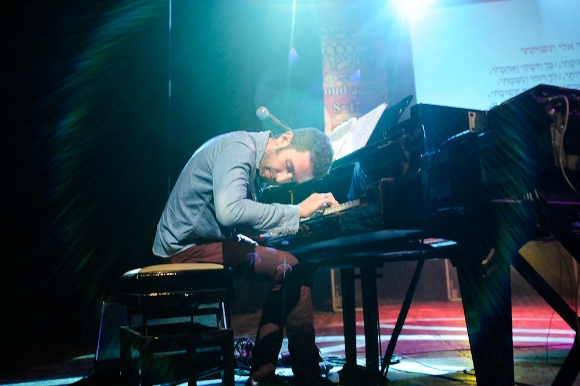
Ibn Ezra’s lyrics were projected as a backdrop to the band, enabling the audience to follow, and even sing along. Each song reflected a different mood and sensibility, enhanced by the wonderful guests (who are also featured on the CD). Lior Elmaliah, well known as the soloist of the Israeli Andalusian Orchestra, joined for a song that reflected traditional piyyut, as well as Andalusian flavor. Shlomi Shaban lent his powerful voice and a stirring piano solo to a song expressing the ardent longing for God – “Lekha Eli Teshukati” (for you, my God, is my desire), an expression of yearning that transcends time.
Shaanan Street of HaDag Nachash brought the groove with a reggae rendition of “Ashkim Lebeit Hasar” – a short plaint on poverty: “When I come to the patron’s house early in the morning, they say: He has already ridden away….woe to the poor man, born to misfortune!” (translated by T. Carmi, The Penguin Book of Hebrew Verse). A light, humorous song easy to relate to, easy to learn and fun to sing along.
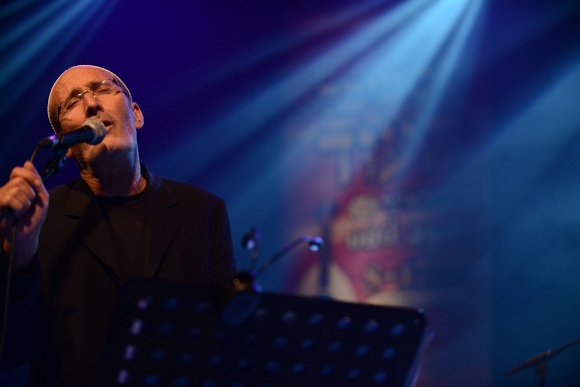
Albert Amar, a paytan with a beautiful voice, resonant with feeling and clarity, illuminating the depths of the soul, sang “Atzula” (nobility), and happily joined in again for the closing numbers of the concert.
Ehud Banai is a star in the rock-piyyut firmament, his presence filled the hall and cranked up the volume. The voice of the ages amplified in Banai’s intense guitar solos and song. Hamadregot’s Damari joined in on shofar for this one, completing the fantastic fusion.
It was a moving and thrilling opening to the festival, in a lovely and prestigious venue as fits the stature of the performing artists and the great Rabbi Abraham Ibn Ezra. Yet as I heard the music, my mind envisioned the same songs performed in a club. As my heart beat in time to the incredible percussion of one of my favorite drummers, Alon Yofeh, I imagined hundreds or thousands of people, young and old, dancing to the lyrics of Ibn Ezra as piyyut rocks on.
“Nedod” is the first single from Abraham Ibn Ezra: Heart, Spirit and Soul – it’s the song I’ve been singing all day, listen, and maybe you’ll be singing it too:
Links: International Oud Festival website
Hadmadregot website
Abraham Ibn Ezra – a selection of poems in English translation




